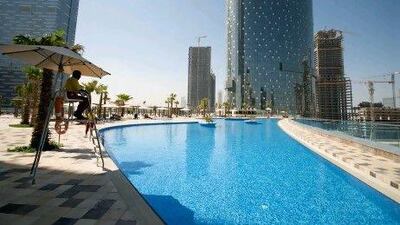The top executive at Sorouh Real Estate, Abu Dhabi's second-largest property company, has joined the chorus of developers calling for lower mortgage interest rates to boost the struggling market.
Video:Is the Reem dream finally coming true?
Kevin Brass discusses the prospects for key Abu Dhabi development Watch full screen
A troubled birth Read all The National's coverage of the much-delayed Reem Island. Learn More
Abubaker Seddiq Al Khouri, Sorouh's managing director, said developers in the capital had been lobbying the government to push rates lower.
"The mortgage rate is a big factor in stimulating the market," Mr Al Khouri told reporters yesterday.
Lower interest rates would jump-start the market at a time when consumers were hesitant to buy property, he said. "We are talking to the Government. We've been doing that for a while and the effect has been positive."
Developers hoping to spark sales are increasingly complaining about interest rates, which are typically between 5 and 9 per cent, depending on the applicant. Lenders also require high down payments on most home loans, usually a minimum of 20 per cent of the purchase price.
At the same time, the three-month Emirates interbank offered rate has declined from a high of 2.07 per cent in April to 1.48.
"They need to lower their [mortgage] rates," Khalid Al Malik, the Dubai Properties Group chief executive, said during last month's Cityscape exhibition in Dubai. "We are struggling because of that."
In many countries whose currencies are pegged to the dollar, mortgage rates are typically between 3 and 4.5 per cent, Mr Al Khouri said.
But mortgage rates cannot be compared to other countries in isolation, said Mohammad Zaqout, the executive vice president of the personal banking group for Al Hilal Bank.
"I believe the rates currently reflect actual market realities, and the fact that they have been dropping recently say a lot on how banks are increasing their risk appetite gradually but slowly on the real-estate sector," Mr Zaqout said.
"Analysts do predict some difficulties in the sector and, accordingly, banks need to factor this in their risk-based pricing to economically protect its capital and shareholders at the same time support the economy at the right equilibrium."
Mortgage rates are coming down.
Last week, United Arab Bank in Sharjah dropped its residential mortgage lending rate to 3.99 per cent from 5.49.
"It is another step towards supporting the recovery of the UAE real estate market from both consumer and developer perspectives," said Paul Trowbridge, the bank's chief executive.
But like many of the low-rate deals offered by mortgage companies in the UAE, United Arab's rate is an adjustable introductory rate. After the first year the rate increases to 5.99 per cent.
The average mortgage rate has fallen from 8 per cent in 2008 to a current level of 5.25 per cent, according to Jean-Luc Desbois, the managing director of Home Matters, a mortgage broker.
"We're hearing developers call for rates to come down, but they are the lowest they have been in 10 years," Mr Desbois said. "Banks are listening."
Banks have restarted lending to employees of the construction and banking industries after years of refusing applications from those sectors, he added. "And they've lowered the monthly income requirement from Dh25,000 a month to Dh15,000."
Sam Wani, the general manager of Independent Finance, a mortgage broker, said: "We're seeing more and more banks falling from highs of 8 to 9 per cent to 5 or 6 per cent."
Banks are still scrutinising buyers carefully, "but the quantity of mortgages has gone up", said Mr Wani.

